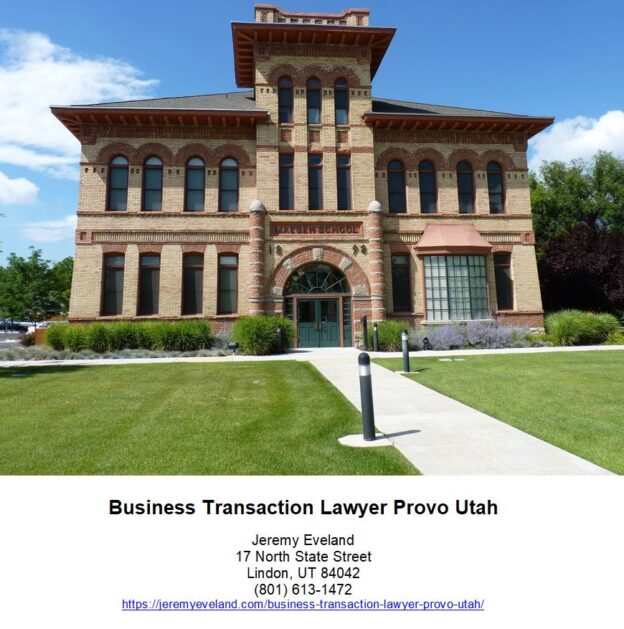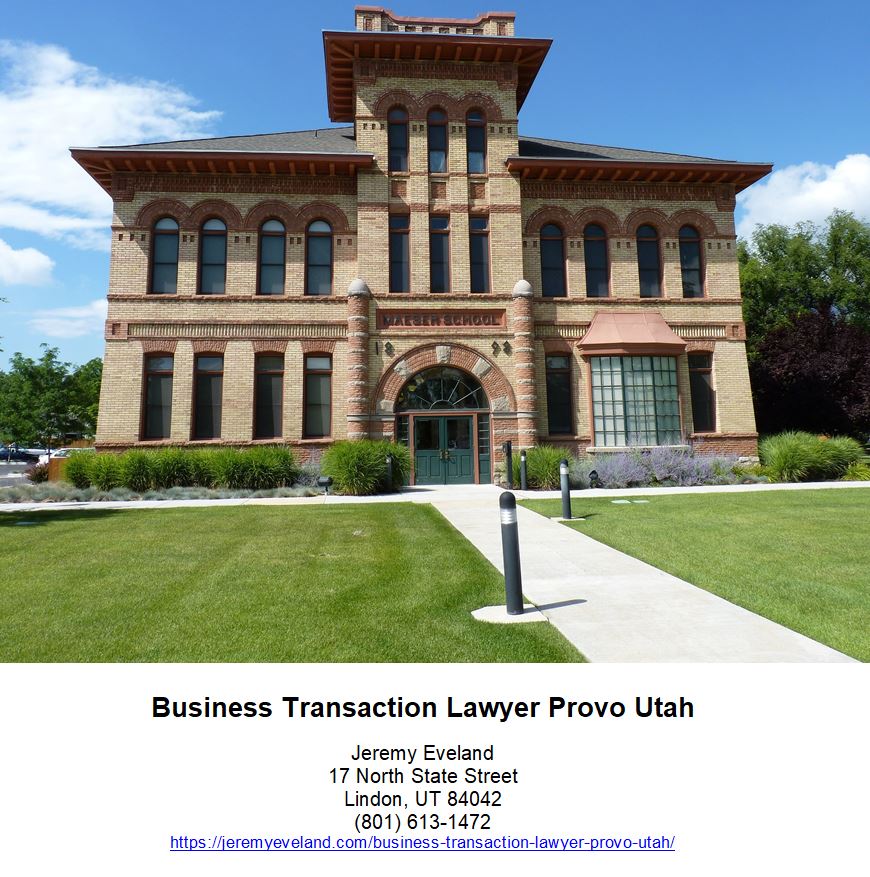Real Estate Attorneys in Salt Lake City Utah
-
Utah Lawyer
- Introduction
- How to Choose the Right Real Estate Attorney in Salt Lake City
- The Benefits of Working with a Real Estate Attorney in Salt Lake City
- Common Real Estate Legal Issues in Salt Lake City and How to Avoid Them
- Understanding the Role of a Real Estate Attorney in Salt Lake City
- Navigating the Real Estate Closing Process in Salt Lake City with an Attorney
- Q&A
“Salt Lake City Real Estate Attorneys: Your Trusted Legal Advisors for Property Transactions”
Introduction
Real estate attorneys in Salt Lake City, Utah are experienced professionals who specialize in the legal aspects of real estate transactions. They provide legal advice and representation to buyers, sellers, landlords, tenants, and other parties involved in real estate transactions. Real estate attorneys in Salt Lake City are knowledgeable about the laws and regulations that govern real estate transactions in the state of Utah. They can help clients navigate the complexities of real estate transactions, from drafting contracts to negotiating terms and closing deals. With their expertise, real estate attorneys in Salt Lake City can help ensure that clients’ interests are protected and that their real estate transactions are successful.
How to Choose the Right Real Estate Attorney in Salt Lake City
When it comes to real estate transactions, having the right attorney can make all the difference. Whether you are buying, selling, or leasing property in Salt Lake City, it is important to choose a real estate attorney who is knowledgeable and experienced in the local market. Here are some tips to help you find the right real estate attorney in Salt Lake City:
1. Research local attorneys: Start by researching local attorneys who specialize in real estate law. Look for attorneys who have experience in the Salt Lake City area and who have a good reputation. Check online reviews and ask for referrals from friends and family.
2. Ask questions: Once you have identified a few potential attorneys, contact them and ask questions about their experience and qualifications. Find out how long they have been practicing real estate law and what types of cases they have handled. Ask about their fees and any other services they offer.
3. Meet in person: Once you have narrowed down your list of potential attorneys, it is important to meet with them in person. This will give you an opportunity to get to know them and ask any additional questions you may have.
4. Check references: Before making a final decision, it is important to check references. Ask the attorney for a list of past clients and contact them to get their feedback. This will help you get a better understanding of the attorney’s experience and reputation.
By following these tips, you can find the right real estate attorney in Salt Lake City to help you with your real estate transaction. With the right attorney, you can be sure that your transaction will be handled professionally and efficiently.
The Benefits of Working with a Real Estate Attorney in Salt Lake City
When it comes to real estate transactions, it is important to have an experienced and knowledgeable attorney on your side. Working with a real estate attorney in Salt Lake City can provide numerous benefits, including the following:
1. Expertise: A real estate attorney in Salt Lake City has the expertise and experience to handle all aspects of a real estate transaction. From reviewing contracts and documents to negotiating terms and closing the deal, a real estate attorney can provide invaluable guidance and advice.
2. Protection: A real estate attorney can help protect your interests throughout the transaction. They can review contracts and documents to ensure that all terms are fair and equitable, and they can help you avoid potential pitfalls.
3. Efficiency: A real estate attorney can help streamline the process and ensure that all deadlines are met. They can also help ensure that all paperwork is properly filed and that all necessary documents are in order.
4. Cost Savings: Working with a real estate attorney can help you save money in the long run. By having an experienced attorney on your side, you can avoid costly mistakes and ensure that the transaction is completed in a timely and cost-effective manner.
When it comes to real estate transactions, it is important to have an experienced and knowledgeable attorney on your side. Working with a real estate attorney in Salt Lake City can provide numerous benefits, including expertise, protection, efficiency, and cost savings. With the help of a real estate attorney, you can ensure that your real estate transaction is completed in a timely and cost-effective manner.
Common Real Estate Legal Issues in Salt Lake City and How to Avoid Them
Salt Lake City is a vibrant and growing city, and with that growth comes a variety of real estate legal issues. It is important to be aware of these issues and take steps to avoid them.
One of the most common real estate legal issues in Salt Lake City is zoning violations. Zoning laws are in place to ensure that buildings are constructed in accordance with local regulations. Violations of zoning laws can result in fines, legal action, and even the demolition of the structure. To avoid zoning violations, it is important to research the local zoning laws and obtain the necessary permits before beginning any construction.
Another common real estate legal issue in Salt Lake City is title disputes. Title disputes occur when two or more parties claim ownership of the same property. These disputes can be costly and time-consuming to resolve. To avoid title disputes, it is important to conduct a thorough title search before purchasing a property. This will ensure that the title is clear and that there are no outstanding claims against the property.
Finally, it is important to be aware of landlord-tenant laws in Salt Lake City. These laws govern the rights and responsibilities of landlords and tenants. It is important to understand these laws and ensure that all rental agreements are in compliance. This will help to avoid potential legal issues and ensure that both parties are protected.
By understanding the common real estate legal issues in Salt Lake City and taking steps to avoid them, you can ensure that your real estate transactions are successful and free from legal complications.
Understanding the Role of a Real Estate Attorney in Salt Lake City
Real estate attorneys in Salt Lake City play an important role in the real estate market. They provide legal advice and representation to buyers, sellers, landlords, tenants, and other parties involved in real estate transactions.
Real estate attorneys in Salt Lake City are knowledgeable in all aspects of real estate law, including contracts, title searches, zoning regulations, and other legal matters. They can help clients understand their rights and obligations under the law, and provide advice on how to best protect their interests.
Real estate attorneys in Salt Lake City can help clients negotiate the terms of a real estate transaction, draft and review contracts, and handle any disputes that may arise. They can also provide guidance on how to structure a transaction to minimize taxes and maximize profits.
Real estate attorneys in Salt Lake City can also help clients with the closing process. They can review closing documents, ensure that all parties are in agreement, and make sure that all necessary paperwork is completed and filed correctly.
Real estate attorneys in Salt Lake City can also provide legal advice on issues related to landlord-tenant law, such as evictions, security deposits, and other matters. They can also help clients with disputes over property boundaries, easements, and other matters.
Real estate attorneys in Salt Lake City are an invaluable resource for anyone involved in a real estate transaction. They can provide legal advice and representation to ensure that all parties are protected and that the transaction is completed in a timely and efficient manner.
Navigating the Real Estate Closing Process in Salt Lake City with an Attorney
Navigating the real estate closing process in Salt Lake City can be a complex and intimidating process. Working with an experienced real estate attorney can help ensure that the process is completed efficiently and accurately.
When purchasing a home in Salt Lake City, it is important to understand the closing process and the role of the attorney. The closing process begins when the buyer and seller sign a purchase agreement. This agreement outlines the terms of the sale, including the purchase price, closing date, and any contingencies. Once the purchase agreement is signed, the buyer will typically hire a real estate attorney to represent them in the closing process.
The attorney’s role is to review the purchase agreement and ensure that all of the terms are in the buyer’s best interest. The attorney will also review any documents related to the sale, such as title documents, surveys, and inspection reports. The attorney will also review any loan documents and advise the buyer on their rights and obligations under the loan.
Once all of the documents have been reviewed, the attorney will prepare the closing documents. These documents include the deed, mortgage, and closing statement. The attorney will also review the closing statement to ensure that all of the costs associated with the purchase are accurate.
On the day of closing, the attorney will attend the closing and review all of the documents with the buyer. The attorney will also answer any questions the buyer may have and ensure that all of the documents are properly executed. Once the closing is complete, the attorney will provide the buyer with a copy of all of the closing documents.
Navigating the real estate closing process in Salt Lake City can be a complex and intimidating process. Working with an experienced real estate attorney can help ensure that the process is completed efficiently and accurately. An attorney can provide valuable advice and guidance throughout the process and ensure that the buyer’s rights and interests are protected.
Q&A
1. What services do real estate attorneys in Salt Lake City provide?
Real estate attorneys in Salt Lake City provide a variety of services, including drafting and reviewing purchase and sale agreements, negotiating contracts, advising on zoning and land use issues, and representing clients in court.
2. What qualifications should I look for in a real estate attorney?
When selecting a real estate attorney, it is important to look for someone who is experienced in the area of real estate law and who is familiar with the laws and regulations in Salt Lake City. Additionally, it is important to find an attorney who is knowledgeable, reliable, and trustworthy.
3. How much does it cost to hire a real estate attorney in Salt Lake City?
The cost of hiring a real estate attorney in Salt Lake City will vary depending on the complexity of the case and the attorney’s experience. Generally, attorneys charge an hourly rate or a flat fee for their services.
4. What types of real estate transactions can a real estate attorney in Salt Lake City help with?
Real estate attorneys in Salt Lake City can help with a variety of real estate transactions, including buying and selling residential and commercial properties, negotiating leases, and resolving disputes.
5. What should I do if I have a dispute with my real estate attorney?
If you have a dispute with your real estate attorney, it is important to contact the Utah State Bar Association to file a complaint. The Bar Association will investigate the complaint and take appropriate action if necessary.
Real Estate Lawyer Consultation
When you need legal help with real estate law call Jeremy D. Eveland, MBA, JD (801) 613-1472 for a consultation.
Jeremy Eveland
17 North State Street
Lindon UT 84042
(801) 613-1472
Related Posts
Business Contract Lawyer Salt Lake City
What Is The Difference Between Corporate And Commercial Law?
Business Contract Lawyer West Valley City
Business Lawyer West Jordan Utah
Irrevocable Life Insurance Trusts
What Is The Purpose Of A Business Attorney?
Business Transaction Lawyer Provo Utah
Trusted Personal Injury Attorneys in Utah
Legal Requirements to Start a Business
Real Estate Attorneys in Salt Lake City Utah
[geocentric_weather id=”79414f66-9f4c-4a1a-9eaa-8bbae65c0683″]
[geocentric_about id=”79414f66-9f4c-4a1a-9eaa-8bbae65c0683″]
[geocentric_neighborhoods id=”79414f66-9f4c-4a1a-9eaa-8bbae65c0683″]
[geocentric_thingstodo id=”79414f66-9f4c-4a1a-9eaa-8bbae65c0683″]
[geocentric_busstops id=”79414f66-9f4c-4a1a-9eaa-8bbae65c0683″]
[geocentric_mapembed id=”79414f66-9f4c-4a1a-9eaa-8bbae65c0683″]
[geocentric_drivingdirections id=”79414f66-9f4c-4a1a-9eaa-8bbae65c0683″]
[geocentric_reviews id=”79414f66-9f4c-4a1a-9eaa-8bbae65c0683″]
























